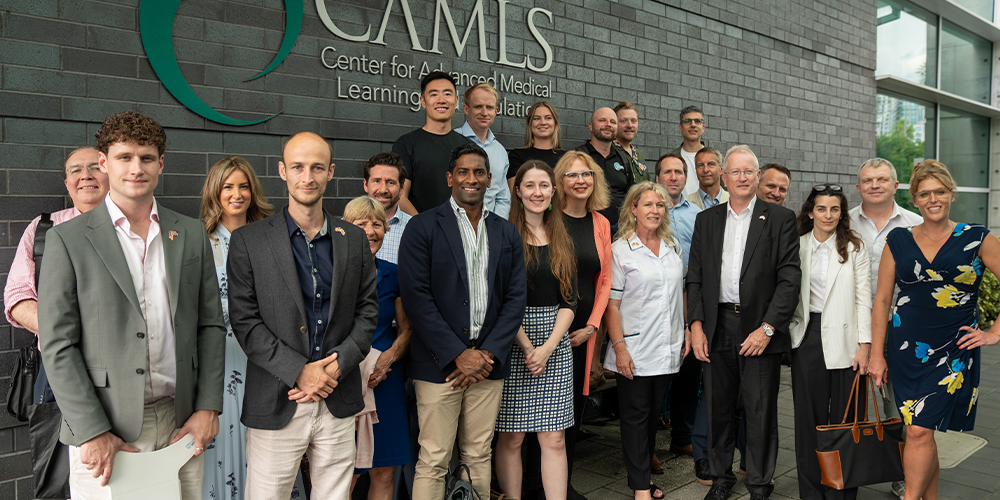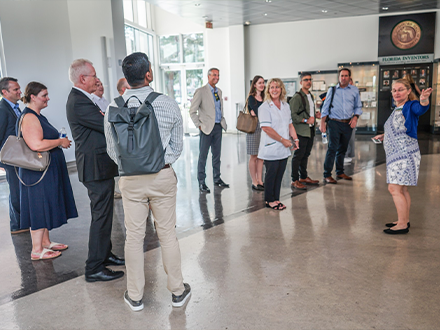
The UK life sciences delegation toured the USF Research Park, including Discovery Hall where the Florida Inventors Hall of Fame is featured. Photo credit: USF Connect
Florida and the U.K. have been essential trade partners for generations, but a new agreement is opening the door to deeper engagement.
The United Kingdom long has been one of Florida’s most important global partners when
it comes to trade, research and academic engagement. Now this friendship is getting
a refresh.
Last year, Florida and British officials signed a Memorandum of Understanding (MOU) that put new focus on trade and development in the innovation economy, as
well as the role of universities in forging the opportunities of the future. The agreement
prioritizes business, research and development in the space industry; fintech; life
sciences; supply chains and logistics; transportation; infrastructure; legal services
and law tech; ag tech and emerging technologies like artificial intelligence, semiconductors,
simulations and photonics.
The MOU is the catalyst for what will be a series of trade missions and the launch
of new engagement efforts, such as the recent weeklong tour of more than 20 life sciences
companies from Great Britain and Northern Ireland who explored Orlando, Tampa and
South Florida as locations for their U.S. operations as well as research and development
collaborations.
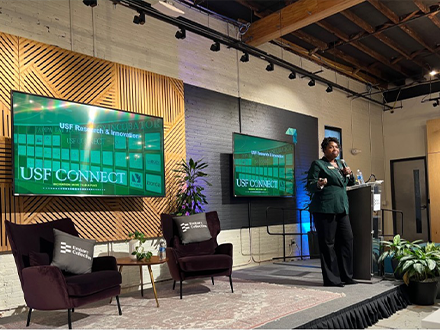
USF Research & Innovation Vice President Sylvia Wilson Thomas shares insights into USF Connect and its programs for technology startups and enterprises during a gathering for the UK delegation at the Embarc Collective in downtown Tampa
The delegation spent two days in Tampa, touring the USF Research Park, downtown’s
Morsani College of Medicine and Taneja College of Pharmacy, and the Center for Advanced
Medical Learning and Simulation (CAMLS). (Meet the U.K. companies on the tour.)
USF has had strong research linkages to the U.K. for decades, including designating the University of Exeter as one of its five strategic research partners in 2009 and establishing a student
exchange program. In 2014, the USF in London summer study abroad program was launched, and it will celebrate its ten-year anniversary
next summer. This milestone event will welcome USF leadership, students, and dozens
of alumni, promising to surpass the success of the 2023 gathering. USF's engagement in the U.K. is reflected in the USF Network U.K. which includes over 730 U.K.-based alumni and 40 current students from the U.K. studying
at USF.
“We are collaborating more than any other foreign direct investor,” said United Kingdom
HM Trade Commissioner Niall Mackenzie, who joined the delegation in Tampa, in a statement.
“By working with local officials to support initiatives like these, we aim to bring
even more jobs and growth to both sides of the Atlantic.”
There’s more engagement soon to come.
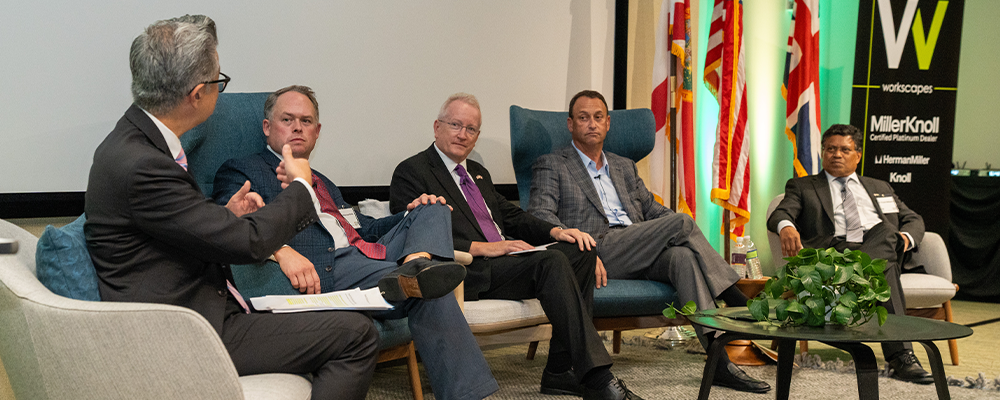
USF Provost Prasant Mohapatra (right) joined TGH President John Couris, UK's HM Trade
Commissioner for North America Niall Mackenzi, Florida Agency for Health Care Administration
Secretary Jason Weida and CAMLS CEO and Executive Director Haru Okuda for a discussion
on the rising profile of Tampa’s life sciences sector and the role USF’s research
and innovation plays in its future
On Oct. 16, Justine Assal, His Britannic Majesty’s Honorary Consul, will return to USF for a reception with USF President Rhea Law and the university community to build upon the connections made in the recent visit. Assal is a veteran entrepreneur and business consultant based in Orlando who was recognized with the prestigious honor of Member of the Order of the British Empire for her work in international economic development. The reception is open for the USF community to attend, but an RSVP is required.
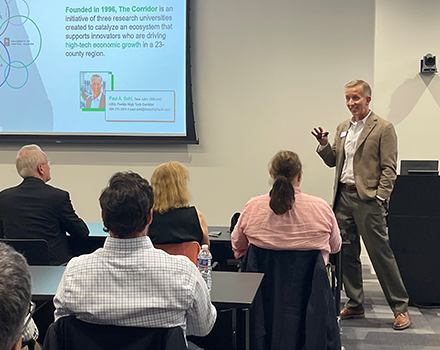
The U.K., which is the top international investor in Florida both in terms of the
total amount invested in Florida (some $6.4 billion) and number of Floridians working
for U.K. firms (approximately 67,500 jobs). According to Uniworld Online’s database
of foreign-owned affiliates in Florida, there are more than 150 British-owned companies
operating more than 700 locations throughout Florida.
Life sciences research and development is thriving in Florida (as they are in the U.K. as well), especially across the Florida High Tech Corridor where the USF, University of Florida
and University of Central Florida pursue billions of dollars in life sciences research
each year while Florida’s hospitals, practitioners, medical device manufacturers and
tech-enabled health solutions companies are innovating to keep up with population
growth and working to keep the population healthier and address longstanding health
care disparities.
“There is a huge opportunity to participate in innovation that will propel the next
generation,” said USF Provost Prasant Mohapatra as he shared with the delegation the university’s plans for a new college of artificial
intelligence and computer science which will, like the Department of Medical Engineering, integrate partnerships with industry into the research portfolio.
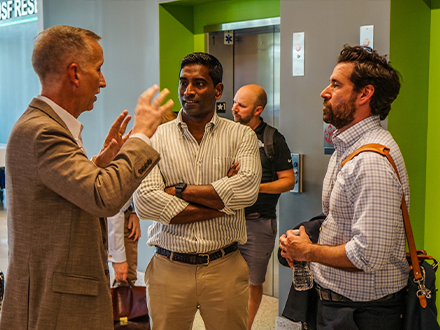
Florida High Tech Corridor CEO Paul Sohl (left) visits with hearing technology company TympaHealth Technologies founder and CEO Krishan Ramdoo (center) and the company’s Miami-based VP of sales David Horowitz
In the life sciences delegation visit to Tampa (Sept 10-11), the delegation toured
the USF Research Park and visited with USF Vice President for Research Sylvia Wilson Thomas, Florida High Tech Corridor CEO Paul Sohl, USF Engineering Professor Stephanie Carey, who directs the Center for Assistive, Rehabilitation and Robotics Technologies. CARRT develops and tests new technologies to assist people with disabilities, including
technologies invented by researchers in USF’s departments of mechanical and medical
engineering. The group then gathered at the Center for Advanced Medical Learning and Simulation, the USF Health center in downtown Tampa that is a global draw for advanced practitioner training.
There, they heard from Tampa General Hospital CEO John Couris about the public-private partnership around research, education and patient care
between USF and TGH and the emerging medical research district that has taken shape
since the Morsani College of Medicine opened in downtown Tampa in 2020.
“We are really defining how medicine is going to be practiced in the next five, 10
or 20 years,” Couris said of the partnership that is advancing new treatments and
practices to patients, from gene therapy to home-based hospital care.
